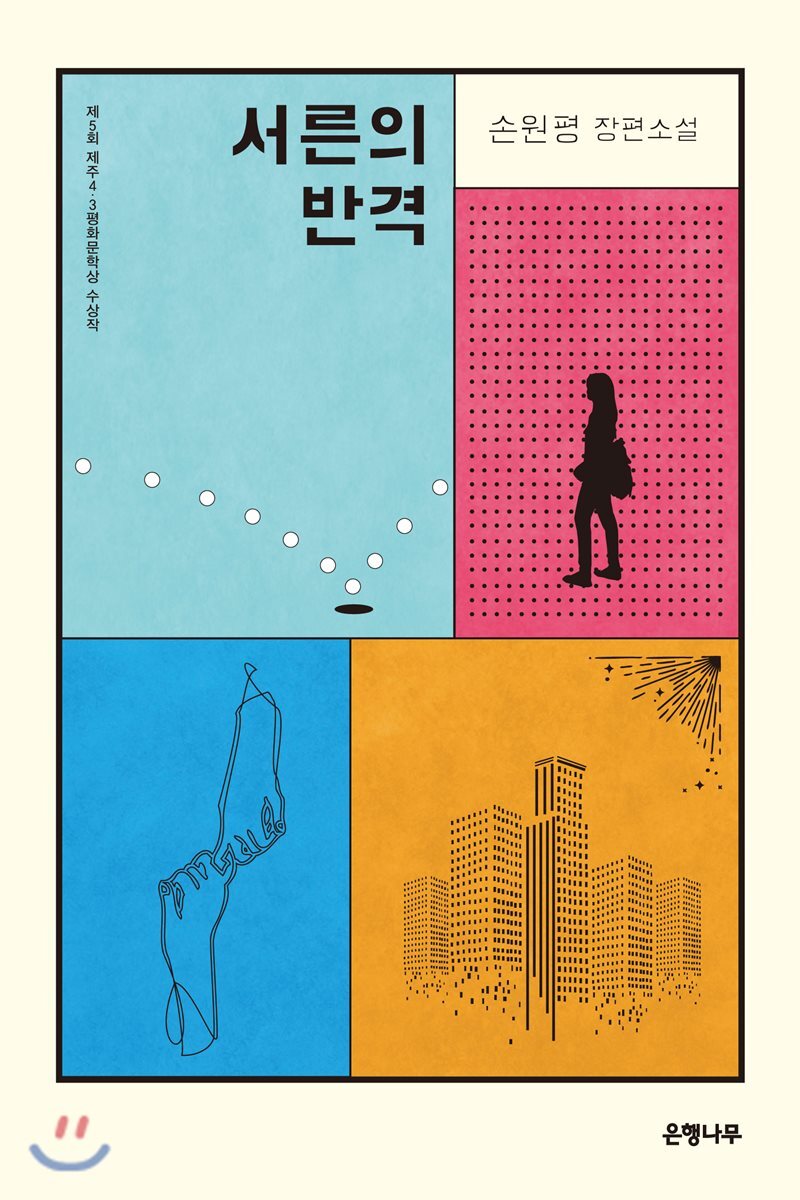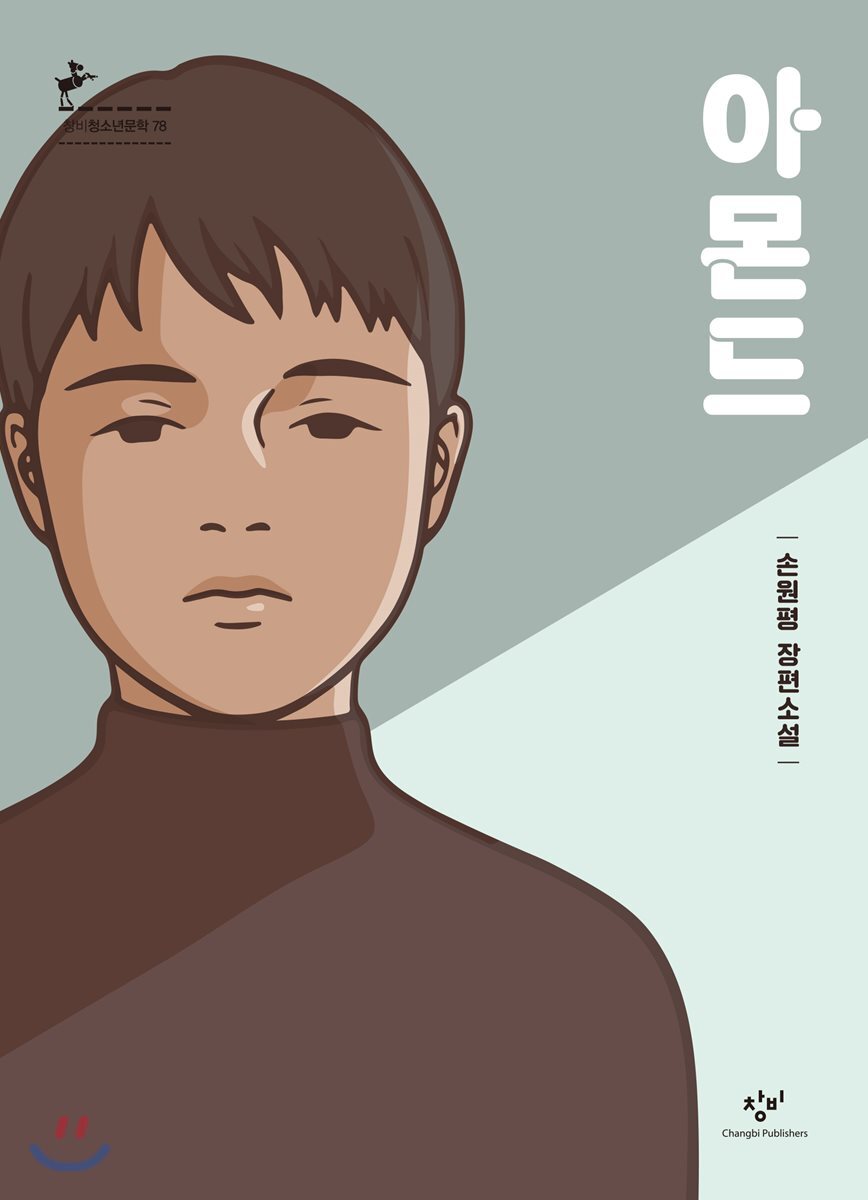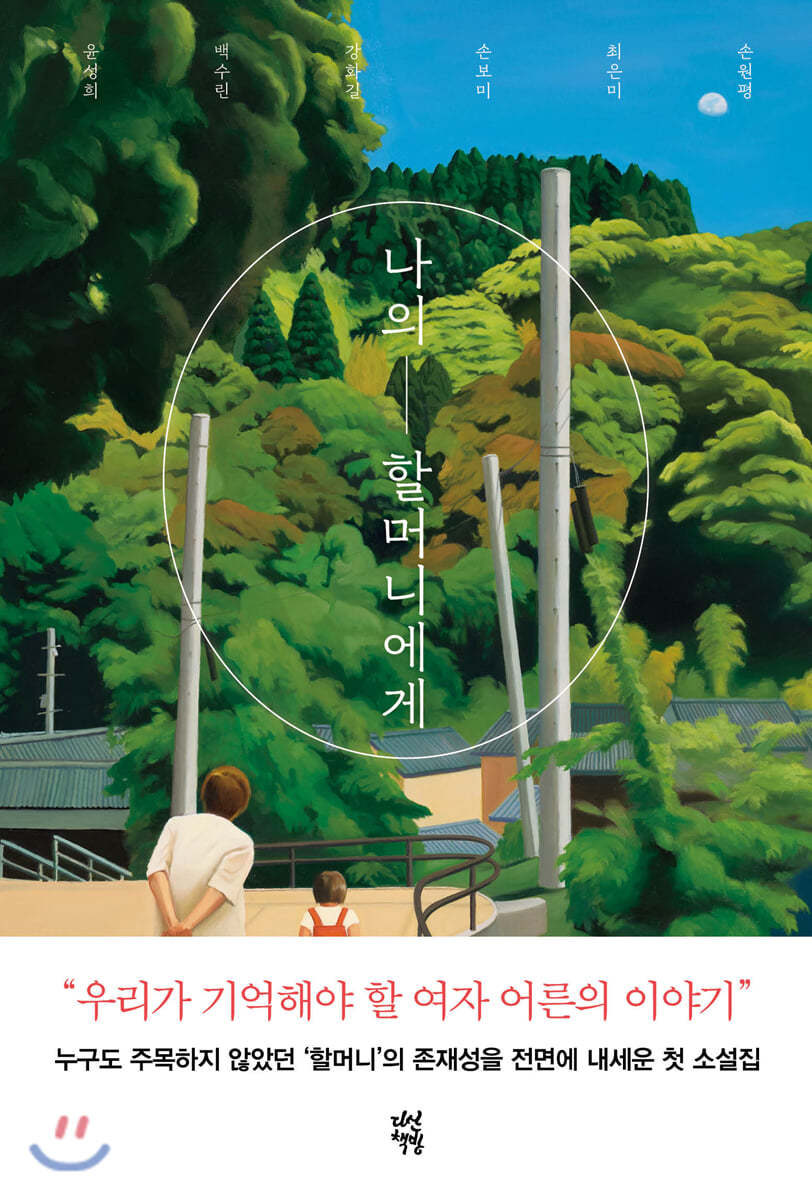도입부
손원평(1979~)은 한국의 소설가이다. 2016년 《아몬드》, 2017년 《서른의 반격》으로 연달아 문학상을 수상하며 소설가로 화려하게 데뷔하였다. 소설쓰기와 영화 작업을 병행하고 있다. 손원평의 소설은 인간 존재와 성장의 의미를 탐구하며, 독특한 캐릭터 설정과 속도감 있는 전개가 돋보인다.
생애
한국의 유명 정치인인 손학규1)의 둘째딸로, 1979년 서울에서 태어났다. 대학에서 사회학과 철학을 전공했다. 사회학에서 배운 구조적 사고방식과 철학에서 배운 개인성에 대한 개념이 소설 쓰기에 도움이 되었다고 생각한다.2) 영화 작업과 소설 쓰기를 병행하고 있다. 두 장르가 표현할 수 있는 것이 다르고, 협업과 개인 작업이란 전혀 다른 제작 방식에 모두 매력을 느끼기 때문에, 앞으로도 어느 한쪽을 포기할 생각이 없다.3)
영화
초등학교 시절부터 소설로 등단하고 싶다는 꿈을 꾸었으나4), 먼저 이름을 알린 것은 영화였다. 2001년 영화 잡지 《씨네21》의 영화평론상을 받으며 영화 평론가로 데뷔하였다. 이후 한국영화아카데미5)에 입학해 영화 연출을 전공하였다. 다수의 단편 영화를 연출하였고, 〈인간적으로 정이 안 가는 인간〉(2005)으로 여러 상을 수상하며 연출력을 인정6)받았다. 또한 2006년에는 과학기술 창작문예 공모전에서 〈순간을 믿어요〉로 시나리오 시놉시스 부문 수상했다.7)
소설
대학시절부터 각종 문학상에 응모할 때마다 만든 가명이 30개가 넘어갈 정도로 꾸준히 도전했지만 모두 실패했다.8) 2013년에 아이를 낳은 후 시간이 생길 때마다 틈틈이 글을 썼는데, 그 시기 생각보다 많은 글을 창작했다고 한다.9) 이때 쓴 《아몬드》가 2016년에 창비 청소년 문학상을 받으면서 뒤늦게 소설가로 데뷔하였다. 《아몬드》는 신인 작가의 작품으로는 이례적으로 세계 12개국, 13개 언어권으로 번역 판권이 팔렸다.10)
이듬해에는 《서른의 반격》(2017)으로 제주 4.3 평화문학상을 수상하였다. 첫 번째 수상 소식이 10년 치의 행복의 충격을 주었기에 두 번째 상에는 오히려 무덤덤했다고 한다.11) 소설가로서도 많은 작품을 창작할 희망을 갖고 있다. 증조모로부터 4대째 이어지는 딸들의 역사를 다룬 대하소설을 구상하고 있다.12)
작품세계
손원평의 소설과 시나리오는 독특한 캐릭터 설정과 영화처럼 속도감 있는 사건 전개를 통해 사회의 문제점들을 정확하게 짚어낸다.13) 이런 특징은 작가 자신의 이야기를 하기보다는, 주제를 먼저 설정하고 주제에 어울리는 인물을 만드는 손원평 특유의 작업 방식과도 관련된다.14)
《아몬드》
《아몬드》(2016)는 작가의 첫 소설이자 대표작이다. 한국형 ‘영 어덜트’ 소설15), 완성도 높은 성장소설이라는 평가를 받았다. 주인공 윤재는 머릿속 아몬드라 불리는 편도체가 작아 ‘알렉시티미아(감정 표현 불능증)’란 장애를 겪는다. 반대로 친구 곤이는 자신 안의 감정을 주체할 수 없어 분노를 폭발시키는 소년이다. 작가는 감정/공감 능력에 문제가 있는 두 소년을 통해 타인에게 무관심한 세태를 암시하며, 진정한 공감의 어려움을 비유적으로 형상화한다. 상처받은 문제아를 위로한 것은 아이러니하게도 공포를 느끼지 못하는 감정 불능자 윤재였다. 감정을 느끼지 못하기에 타인의 행동 동기를 궁금해 하는 인물을 통해 작가는 진정한 공감을 위해서는 특별한 노력이 필요함을 강조한다.
《서른의 반격》
《서른의 반격》(2017)은 제대로 된 어른이 되고 싶은 젊은 세대의 고민과 상실감을 다룬 소설이다. ‘주인공 김지혜는 1988년생이다.’ 이 짦은 문장은 독자들에게 1988년라는 연도가 한국 사회에서 갖는 의미와 그 당시 유행했던 ‘지혜’라는 평범한 이름을 떠올리게 한다.16) 1988년은 오래 지속된 군사 독재의 해체와 민주주의의 실현에 대한 사회적 기대와 희망이 결국 절반의 성공(실패)로 끝난 시기였다. 당시 태어난 수많은 ‘지혜’들은 그저 평범해지는 것을 꿈꾸며 사는 ‘88만원 세대’17)로 성장하였다.
지혜와 규옥, 무인과 남은 등 동갑내기 친구들은 부당한 사회를 향해 나름의 반격을 시도한다. 하지만 그 반격은 부도덕한 국회의원에게 날계란을 던지거나, 수시로 방귀와 트림을 하는 김부장에게 조롱 편지를 보내는 등의 장난 혹은 놀이에 불과하다. 물론 이런 행위들에 사회를 뒤집을 만큼의 힘은 없지만, 부당한 일상적 환경에 작은 균열 낼 정도는 되나. 어쩔 수 없다는 포기 대신 경쾌하게 지속되는 작은 저항을 통해 불합리의 수긍을 거부하는 것이다.18)
《4월의 눈》
《4월의 눈》(2018)은 고통을 겪는 사람과 타인의 고통을 이해하려는 사람이 만드는 ‘공감의 순간’을 다룬다.19) 사산된 아이 때문에 고통받던 부부는 국적도 인종도 세대도 다른 마리를 만난다. 마리가 겪은 고통의 사연은 등장하지 않지만, 그녀는 부부의 고통을 깊이 공감하고 위로해준다. 그들의 대화는 4월에 내린 폭설처럼 예상치 못한 사건과도 같지만, 예외 없이 아픈 사람들 모두에게 ‘외롭고 다정한 위로’를 던진다.20)
주요작품
《아몬드》, 창비, 2017.
《서른의 반격》, 은행나무, 2017.
번역된 작품
《4월의 눈》 k-픽션 21, 도서출판 아시아, 2018.
수상 내역
2016년 창비 청소년 문학상 (수상작 《아몬드》)21)
2017년 제주 4.3 평화문학상 (수상작 《서른의 반격》)22)
참고 문헌
1) 손원평의 아버지는 한국의 정치인 손학규이다. 손학규는 학생운동, 노동운동 등을 하다가 1993년 이후에는 정치계에서 활동 중이다. 손원평이 영화제에 작품을 출품했을 때 손학규의 둘째 딸이라는 사실이 신문 기사 제목으로 나오기도 했다. 언니 손원정도 연극계에서 연출 활동을 하고 있다.
한국 위키피디아 [손학규]
https://ko.wikipedia.org/wiki/손학규
서필웅, 〈손학규 전지사 차녀 원평씨 단편영화 출품〉, 《서울경제》, 2007.04.26.
https://entertain.naver.com/read?oid=011&aid=0000180132
2) 정연심, 〈『서른의 반격』 손원평 ‘없는 사람’에서 ‘있는 사람’으로 전복을 꿈꾸다〉, 《독서신문》, 2017.11.23.
http://www.readersnews.com/news/articleView.html?idxno=76723
3) 김슬기, 〈소설가 손원평 “영화도 소설도 놓치고 싶지 않아요”〉, 《매일경제》, 2017.04.02.
https://www.mk.co.kr/news/culture/view/2017/04/222812/
4) 최규화, 〈작가인터뷰-손원평 “타인을 공감한다는 것, 자만일 수도 있어”〉, 《book db》, 2017.05.10.
http://news.bookdb.co.kr/bdb/Interview.do?_method=InterviewDetail&sc.mreviewTp=1207&sc.mreviewNo=78003&Nnews
5) 한국영화아카데미는 1984년 설립된 영화전문교육기관이다. 집약적으로 영화에 관해 학습한 후, 한 해 4편의 영화를 직접 제작해보며 실력을 쌓는다. 이렇게 만들어진 영화들은 국제영화제에 출품되었다. 한국의 유명 영화인재를 700명 이상 배출하였다.
한국영화아카데미 홈페이지, KAFA 소개.
http://www.kafa.ac/front/content/contentViewer.do?contentId=CONTENT_0000021
네이버 지식백과, 한국민족문화대백과 [한국영화아카데미]
https://terms.naver.com/entry.nhn?docId=3326888&cid=46665&categoryId=46665
6) 네이버 영화, [인간적으로 정이 안 가는 인간]
https://movie.naver.com/movie/bi/mi/basic.nhn?code=40257
임순혜, 〈서울여성영화제〉, 《네이버뉴스》, 2005.04.18.
https://news.naver.com/main/read.nhn?mode=LSD&mid=sec&sid1=117&oid=078&aid=0000012725
7) 손원평 작가의 첫 장편 영화 《도터》(가제)를 촬영 중이다. 실종된 여동생이 25년 만에 집으로 돌아오는 이야기로, 낯선 그녀를 의심스럽게 지켜보는 오빠와 가족들의 미스터리를 그린 스릴러이다.
정헌희, 〈베스트셀러 『아몬드』, 책 20만부 돌파 기념 손원평 작가와 함께하는 북토크가 열려〉, 《한국강사신문》, 2018.09.24.
http://www.lecturernews.com/news/articleView.html?idxno=7367
〈"펜 대신 메가폰"… 손원평·천명관 작가 연출 도전, 제2의 이창동 나올까〉, 《스포츠조선》, 2019.04.04.
http://sports.chosun.com/news/ntype.htm?id=201904050100033910001994&servicedate=20190404
8) 강주화, 〈소설가 손원평 “앉으면 무조건 썼다… 나도 읽고 싶은 소설”〉, 《국민일보》, 2018.01.18.
http://news.kmib.co.kr/article/view.asp?arcid=0923886127&code=13110000&cp=nv
9) 최규화, 〈작가인터뷰-손원평 “타인을 공감한다는 것, 자만일 수도 있어”〉, 《book db》, 2017.05.10.
http://news.bookdb.co.kr/bdb/Interview.do?_method=InterviewDetail&sc.mreviewTp=1207&sc.mreviewNo=78003&Nnews
10) 연승, 〈손원평 소설 ‘아몬드’ 전세계 12개국 수출〉, 《서울경제》, 2019.03.11.
https://www.sedaily.com/NewsView/1VGJQ2JPD4
11) 김슬기, 〈소설가 손원평 “영화도 소설도 놓치고 싶지 않아요”〉, 《매일경제》, 2017.04.02.
https://www.mk.co.kr/news/culture/view/2017/04/222812/
12) 강주화, 〈소설가 손원평 “앉으면 무조건 썼다… 나도 읽고 싶은 소설”〉, 《국민일보》, 2018.01.18.
http://news.kmib.co.kr/article/view.asp?arcid=0923886127&code=13110000&cp=nv
신연선, 〈손원평 “이해할 수 없는 사람도 계속 사랑할 수 있을까”〉, 《채널예스》, 2017.04.28.
http://ch.yes24.com/Article/View/33307
13) 《아몬드》 책소개
https://www.aladin.co.kr/shop/wproduct.aspx?ItemId=106366621
《서른의 반격》 책소개
https://www.aladin.co.kr/shop/wproduct.aspx?ItemId=119877647
정연심, 〈『서른의 반격』 손원평 ‘없는 사람’에서 ‘있는 사람’으로 전복을 꿈꾸다〉, 《독서신문》, 2017.11.23.
http://www.readersnews.com/news/articleView.html?idxno=76723
14) 신연선, 〈손원평 “이해할 수 없는 사람도 계속 사랑할 수 있을까”〉, 《채널예스》, 2017.04.28.
http://ch.yes24.com/Article/View/33307
15) 영 어덜트(Young Adult) 소설이란 10대 주인공이 현실을 초월한 상상의 세계에서 삶을 경험하고, 결핍과 상처를 극복하여 성장하는 청소년 문학을 가리키는 영미권 용어였다.
《아몬드》 책소개
https://www.aladin.co.kr/shop/wproduct.aspx?ItemId=106366621
16) 《서른의 반격》 책소개
https://www.aladin.co.kr/shop/wproduct.aspx?ItemId=119877647
17) 88만원 세대는 대학을 졸업한 후에도 미래에 대한 불안 속에서 비정규직으로 일하고 있는 한국의 20대를 은유적으로 포현한 단어이다. 일본의 ‘버블 세대’나 유럽의 ‘천유로 세대’, 미국의 ‘빈털터리 세대’와 유사한 의미를 내포한다.
네이버지식백과, 대중문화사전 [88만원 세대]
https://terms.naver.com/entry.nhn?docId=371089&cid=42028&categoryId=42028
18) 한편에서는 본질에 접근하지 못하는 자기 위안 혹은 부도덕한 기성세대와 젊은이 구도의 도식화라는 비판적 평도 존재한다. 하지만 작가는 어두운 현실을 무겁게 다루기보다는 그 안에 발랄함과 희망을 찾고 싶었다고 말한다.
정연심, 〈『서른의 반격』 손원평 ‘없는 사람’에서 ‘있는 사람’으로 전복을 꿈꾸다〉, 《독서신문》, 2017.11.23.
http://www.readersnews.com/news/articleView.html?idxno=76723
19) 《4월의 눈》 책소개
https://www.aladin.co.kr/shop/wproduct.aspx?ItemId=142163349
20) 전소영, 〈해설 : 더없이 외롭고 다정한 위로〉, 《4월의 눈》, 도서출판 아시아, 2018.
21) 손영옥, 〈창비청소년문학상에 손원평 장편소설 ‘아몬드’〉, 《국민일보》, 2016.11.15.
http://news.kmib.co.kr/article/view.asp?arcid=0923643167&code=13150000&cp=nv
22) 이승록, 〈손학규 차녀 손원평씨, 제주4.3 평화문학상 수상〉, 《제주의 소리》, 2017.03.15
http://www.jejusori.net/news/articleView.html?idxno=188520
Introduction
Sohn Won-pyung (1979 – ) is a South Korean novelist. She had a sparkling literary debut, winning two consecutive literary awards: in 2016 for Amondeu (아몬드 Almond) and in 2017 for Seoreunui bangyeok (서른의 반격 Counterattack of the Thirty). She has since been actively engaged in both novel writing and film work. Sohn’s novels explore the meaning of human existence and growth, and are characterized by the use of unique characters and rapid plot development.
Life
She was born in Seoul, South Korea in 1979 as the second daughter of Sohn Hak-kyu, a renowned Korean politician[1]. In college, she majored in both sociology and philosophy. Sohn believes that structured thinking skills she acquired from learning sociology and the concept of individuality she learned as a student of philosophy have been conducive to her novel writing.[2] Notably, she has been actively engaged in both film making and novel writing. She says that because the two genres are unique in their expressive realms and because she is attracted to both collaborative and personal creative processes, she will continue to pursue her career in both fields.[3]
Films
Although Sohn had dreamed of becoming a professional novelist since she was in elementary school[4], her debut in the film industry preceded her literary debut. In 2001, she won a Film Criticism Award (영화평론상) from the film magazine Cine 21. Later she attended the Korean Academy of Film Arts (KAFA) and majored in film directing.[5] After graduation, she directed a number of short films, winning several awards and critical acclaim for Inganjeogeuro jeongi an ganeun ingan (인간적으로 정이 안 가는 인간 Ooh, You Make Me Sick) (2005).[6] Furthermore, she won a Best Scenario Synopsis Award (시나리오 시놉시스 부문상) at the 2006 SF Creative Writing Contest (과학기술 창작문예 공모전) for Sunganeul mideoyo (순간을 믿어요 I Believe in the Moment).[7]
Novels
Since her college years, she had repeatedly applied for numerous literary awards, using more than 30 pen names, but had not been successful.[3] In 2013, she gave birth to a baby and began writing a small amount of words whenever she had time to spare. Sohn recalls that during this period she wrote much more than expected.[9] It was during this period of her life that she had her belated literary debut as a novelist by winning a Changbi Prize for Young Adult Fiction (2016) for Almond. The translation rights for Almond were sold to 13 different language regions in 12 countries around the globe, an extremely rare case for a novice writer’s work.[10]
The following year, she won a Jeju 4.3 Peace Literary Prize (제주 4.3 평화문학상) for Seoreunui bangyeok. Sohn says that since the news of her first award winning had given her ten years’ worth of happiness, the news of her second award winning did not excite her very much.[11] As a novelist, she hopes to create a number of works. In particular, she is planning to write an epic novel depicting the history of four generations of daughters.[12]
Writing
Sohn Won-pyung’s novels and scenarios sharply pinpoint critical social issues, through the use of unique characters and speedy plot development.[13] Such characteristic of her works is related to Sohn’s unique way of creating literary and cinematic works, where she determines a subject matter first before creating characters suitable for the subject.[14]
Almond
Almond (2016) is Sohn’s debut novel and representative work. It was critically acclaimed as a great coming-of-age novel and an outstanding young adult fiction stylized in a uniquely Korean fashion.[15] The lead character Yun-jae suffers from alexithymia, a subclinical inability to identify and describe emotions, as he has a relatively small amygdala, whose etymological meaning is “almond.” On the other hand, his friend Goni is a boy who cannot control his emotions and bursts out his anger. Ironically, it was Yun-jae, the emotionally disabled boy who is unable to feel any fear, who gave solace to the emotionally hurt problem child Goni. Through a character who cannot feel any emotions and therefore is curious about the behavior of the Other, the author stresses that true compassion requires special efforts.
Seoreunui bangyeok
Seoreunui bangyeok (2017) is a novel about the concerns and a sense of loss felt by younger generations who want to become proper adults. In the novel, the short sentence “The main character Kim Ji-hye was born in 1988.” reminds us of the special meaning the year 1988 has in Korean society and of the common name “Ji-hye” that was popular at the time.[16] The year 1988 was when the prolonged military dictatorship had finally come to an end and when the social expectations and hope for the realization of democracy ended up having a halfway success (or failure). Numerous “Ji-hyes” who were born at the time have now grown to become members of the so-called “880,000 Won Generation.”[17], and their only dream is to become “ordinary.”
In the novel, Ji-hye, Gyu-ok, Mu-in and Nam-eun, all are friends of the same age, attempt their own counterattack against their unfair society. However, their revenge is mere practical jokes or acts of play, such as throwing a raw egg toward an immoral member of the National Assembly and sending a mocking letter to the rude General Manager Kim who is always farting and burping. Even though such pranks do not have the power to overthrow society, they can make a small crack in their unfair daily environment. In this way, instead of giving up and accepting their realities, they manifest their rejection of the irrationality through blithe acts of resistance that continue in small ways.
Saworui nun
Saworui nun (사월의 눈 April Snow) (2018) deals with the “moment of compassion” between someone who suffers and someone who tries to understand the suffering of the Other.[19] In this novel, a couple distressed by their baby’s stillbirth meets Mari who belongs to a different nationality, race, and generation from this couple. The reason for Mari’s own suffering is unknown, but she nevertheless deeply empathizes with them and gives consolation. Their conversation is a completely unexpected event—like a blizzard in April. However, without exception, it provides all those who are suffering with “lonesome yet affectionate solace.”[20]
Works
《아몬드》, 창비, 2017 / Almond (Almond), Changbi, 2017
《서른의 반격》, 은행나무, 2017 / Seoreunui bangyeok (Counterattack of the Thirty), EunHaengNaMu, 2017
Works in Translation
《4월의 눈》 k-픽션 21, 도서출판 아시아, 2018 / April Snow K-Fiction Series 21, ASIA, 2018
Awards
Changbi Prize for Young Adult Fiction (2016) for Almond[21]
Jeju 4.3 Peace Literary Prize (제주 4.3 평화문학상, 2016) for Seoreunui bangyeok[22]
References
[1] Sohn Won-pyung’s father is South Korean politician Sohn Hak-kyu. He had been involved in student and labor movements before entering politics in 1993. When she submitted her work for a film festival, there was a newspaper article that mentioned in its title that she is the second daughter of Sohn Hak-kyu. Her elder sister, Sohn Won-jeong, directs plays.
Wikipedia Korea. “Sohn Hak-kyu.” https://ko.wikipedia.org/wiki/손학규.
Seo, Pil-ung. “Former Governor Sohn Hak-kyu’s Second Daughter Won-Pyung Submits Her Short Film.” Seoul Economic Daily, April 26, 2007. https://entertain.naver.com/read?oid=011&aid=0000180132.
[2] Jeong, Yeon-sim. “Dreaming of a Reversal from a ‘Have-Not’ to a ‘Have’: Seoreunui bangyeok by Sohn Won-pyung.”Readers News, November 23, 2017. http://www.readersnews.com/news/articleView.html?idxno=76723.
[3] Kim, Seul-gi. “’I Cannot Give Up Either Film or Novel’: Novelist Sohn Won-Pyung.” Maeil Business Newspaper. https://www.mk.co.kr/news/culture/view/2017/04/222812/.
[4] Choi, Gyu-hwa. “Interview With Author Sohn Won-Pyung: ‘Empathizing With the Other, It May Be a Vain Thought.” Book DB. http://news.bookdb.co.kr/bdb/Interview.do?_method=InterviewDetail&sc.mreviewTp=1207&sc.mreviewNo=78003&Nnews.
[5] Established in 1984, the Korean Academy of Film Arts (KAFA) is a specialized film education institution. Here, students learn about all aspects of film through an intensive curriculum and then produce 4 films per year to gain practical experience. These films have been shown in international film festivals. The school has graduated over 700 movie talent.
Korean Academy of Film Arts (KAFA). “About KAFA.” http://www.kafa.ac/front/content/contentViewer.do?contentId=CONTENT_0000021.
Naver Knowledge Dictionary, Encyclopedia of Korean Culture. “Korean Academy of Film Arts (KAFA).” https://terms.naver.com/entry.nhn?docId=3326888&cid=46665&categoryId=46665.
[6] Naver Movie. “Ooh, You Make Me Sick.” https://movie.naver.com/movie/bi/mi/basic.nhn?code=40257.
Im Sun-hye. “Seoul International Women's Film Festival.” Naver News, April 18, 2005. https://news.naver.com/main/read.nhn?mode=LSD&mid=sec&sid1=117&oid=078&aid=0000012725.
[7] Author Sohn Won-pyung’s first feature film Daughter (tentative title) is currently being filmed. It is a mystery thriller movie where a sister returns home after gone missing for 25 year and her elder brother and other family members treat their now unfamiliar sister with suspicion.
Jeong, Heon-hui. “Author Sohn Won-Pyung’s Book Concert Celebrates Almond’s Crossing 20,000 Sales Mark.” Korea Lecturer News, September 24, 2018. http://www.lecturernews.com/news/articleView.html?idxno=7367.
“‘Megaphone for Pen’ . . . Authors Sohn Won-Pyung and Cheon Myeong-Kwan Try Film Directing. Will They Become Next Lee Chang-Dong?” Sports Chosun. http://sports.chosun.com/news/ntype.htm?id=201904050100033910001994&servicedate=20190404.
[8] Gang Ju-hwa. “’Being Seated Meant Writing . . . Even I Want to Read This Novel’: Novelist Sohn Won-Pyung.” Kukmin Ilbo, January 18, 2018. http://news.kmib.co.kr/article/view.asp?arcid=0923886127&code=13110000&cp=nv.
[9] Choi, Gyu-hwa. “Interview With Author Sohn Won-Pyung: ‘Empathizing With the Other, It May Be a Vain Thought.” Book DB. http://news.bookdb.co.kr/bdb/Interview.do?_method=InterviewDetail&sc.mreviewTp=1207&sc.mreviewNo=78003&Nnews.
[10] Yeon Seung. “Sohn Won-Pyung’s Novel Almond Sells in 12 Countries.” Seoul Economic Daily, March 11, 2019.
https://www.sedaily.com/NewsView/1VGJQ2JPD4.
[11] Kim, Seul-gi. “’I Cannot Give Up Either Film or Novel’: Novelist Sohn Won-Pyung.” Maeil Business Newspaper. https://www.mk.co.kr/news/culture/view/2017/04/222812/.
[12] Gang Ju-hwa. “’Being Seated Meant Writing . . . Even I Want to Read This Novel’: Novelist Sohn Won-Pyung.” Kukmin Ilbo, January 18, 2018. http://news.kmib.co.kr/article/view.asp?arcid=0923886127&code=13110000&cp=nv.
Sin, Yeon-seon. “Can Someone Who Cannot Understand Continue to Love?: Son Won-Pyung.” Channel Yes. http://ch.yes24.com/Article/View/33307.
[13] Aladin Book Review. “Almond.” https://www.aladin.co.kr/shop/wproduct.aspx?ItemId=106366621.
Aladin Book Review. “Seoreunui bangyeok.” https://www.aladin.co.kr/shop/wproduct.aspx?ItemId=119877647.
Jeong, Yeon-sim. “Dreaming of a Reversal from a ‘Have-Not’ to a ‘Have’: Seoreunui bangyeok by Sohn Won-pyung.”Readers News, November 23, 2017. http://www.readersnews.com/news/articleView.html?idxno=76723.
[14] Sin, Yeon-seon. “Can Someone Who Cannot Understand Continue to Love?: Son Won-Pyung.” Channel Yes. http://ch.yes24.com/Article/View/33307.
[15] Young adult fiction is a literary term used in English-speaking cultures to describe literature targeted to teenagers. Often in this genre, a teenager main character experiences life in their imaginary world beyond reality and comes of age by overcoming emotional trauma and a sense of deprivation.
Aladin Book Review. “Almond.” https://www.aladin.co.kr/shop/wproduct.aspx?ItemId=106366621.
[16] Aladin Book Review. “Seoreunui bangyeok.” https://www.aladin.co.kr/shop/wproduct.aspx?ItemId=119877647.
[17] The 880,000 Won Generation metaphorically refers to Korean youth in their twenties who, even after graduating from college, have to work as irregular workers and live in fear about uncertain future. The term is similar to Japan’s Bubble Generation, Europe’s 1,000 Euro Generation, and America’s Generation Broke.
Naver Knowledge Encyclopeida, Popular Culture Dictionary. “880,000 Won Generation.” https://terms.naver.com/entry.nhn?docId=371089&cid=42028&categoryId=42028.
[18] There is a criticism that the novel schematizes a type of self-reassurance that fails to tackle the essence of reality while unfairly juxtaposing immoral older generations and younger generations. However, the author says that, instead of handling today’s dark reality in a grave tone, she wanted to find liveliness and hope within that reality.
Jeong, Yeon-sim. “Dreaming of a Reversal from a ‘Have-Not’ to a ‘Have’: Seoreunui bangyeok by Sohn Won-pyung.”Readers News, November 23, 2017. http://www.readersnews.com/news/articleView.html?idxno=76723.
[19] Aladin Book Review. “Saworui nun.” https://www.aladin.co.kr/shop/wproduct.aspx?ItemId=142163349.
[20] Jeon, So-yeong. “Introduction: Consolation That Couldn’t be More Lonesome and Comforting” In April Snow, ASIA, 2018.
[21] Son, Yeong-ok. “Sohn Won-Pyung’s Novel Almond Wins Changbi Prize for Young Adult Fiction.” Kukmin Ilbo, November 15, 2016. http://news.kmib.co.kr/article/view.asp?arcid=0923643167&code=13150000&cp=nv.
[22] Lee, Seung-rok. “Politician Sohn Hak-Kyu’s Second Daughter Sohn Won-Pyung Wins Jeju 4.3 Peace Literary Prize.” Jejuui Sori. http://www.jejusori.net/news/articleView.html?idxno=188520.





